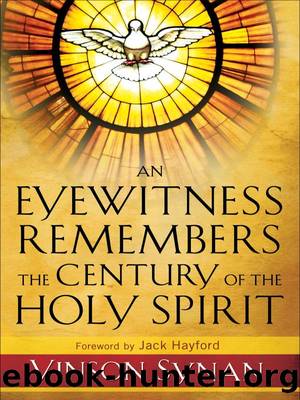Eyewitness Remembers the Century of the Holy Spirit, An by Vinson Synan

Author:Vinson Synan
Language: eng
Format: mobi
Tags: ebook, book
Publisher: Baker Publishing Group
Published: 2010-03-31T23:00:00+00:00
8
The Third Wave
By 1980, two powerful waves of renewal were well established in the church world: the Pentecostal revival, which began in 1901, and the charismatic renewal, with beginnings in 1960. Although many important differences distinguished the two movements, both accepted the idea that a separate subsequent experienceâcalled baptism in the Holy Spiritâoccurred in believersâ lives after their conversion. In addition, both movements emphasized speaking in tongues as an important accompaniment to this experience.
The most significant difference that existed between the two movements was that Pentecostals held tenaciously to the teaching that speaking in tongues was the necessary âinitial evidenceâ of post-conversion baptism in the Holy Spirit, while the new charismatics in mainline churches saw tongues as one of the charismata, which might or might not come at the time of the Pentecostal experience. To charismatics, all of the other gifts of the Spirit were also signs of the infilling with the Holy Spirit.
Interestingly, the first wave of charismatic leaders stood very close to their Pentecostal brothers and sisters in their view of tongues. Dennis Bennett, while not using the term âevidence,â said that tongues were âpart of the packageââjust as tongues are parts of a pair of shoes that canât be purchased separate from the shoes. This meant that without tongues, an individual couldnât claim to be baptized in the Holy Spirit. Rodman Williams, the Presbyterian charismatic theologian, wrote in his classic Renewal Theology that speaking in tongues was the âprimary evidenceâ of the baptism in the Holy Spirit. George Montague and Kilian McDonnell, in their classic book Christian Initiation and the Baptism in the Holy Spirit: Evidence from the First Eight Centuries, pointed to speaking in tongues as holding a âprivilegedâ place in the New Testament witness to the baptism in the Holy Spirit. The same could be said of many of the first wave of charismatic leaders; most would agree that while speaking in tongues was not always the necessary evidence, it was still sought as the expected consequence of the Pentecostal experience.
In time, most charismatic theologians used the term âactualization,â meaning that the Holy Spirit and His gifts were received at baptism but released later. Like a timed-release medical pill that bursts into action some time after being swallowed, what charismatics called the âbaptism in the Holy Spiritâ was tied to initiation, although it was permissible to speak of the experience as a discrete, freestanding experience. Some critics, such as Presbyterian theologian Henry Lederly, spoke critically of actualization language as a âtime bombâ theory, but most charismatics in both Protestant and Catholic traditions were comfortable with the term âactualizationâ or âreleaseâ rather than âevidence.â Both Pentecostals and charismatics continued to accept the idea of a subsequent experience called âbaptism in the Holy Spirit,â with the expectation that speaking in tongues would come at the time of the experience or shortly afterward.
As newer independent charismatic denominations formed over time, they were forced to choose between the older Pentecostal model or the newer charismatic model. The most prominent
Download
This site does not store any files on its server. We only index and link to content provided by other sites. Please contact the content providers to delete copyright contents if any and email us, we'll remove relevant links or contents immediately.
| Anglican | Baptist |
| Book of Common Prayer | Calvinist |
| Episcopalian | Inspirational |
| Lutheran | Methodist |
| Pentecostal & Charismatic | Presbyterian |
| Quaker | Seventh-Day Adventist |
| Shaker | Theology |
Angels by Billy Graham(1914)
How To Be Born Again by Billy Graham(1773)
Peace with God by Billy Graham(1675)
Unbroken Curses by Rebecca Brown & Daniel Yoder(1566)
God's Prophetic Symbolism in Everyday Life by Adam Thompson & Adrian Beale(1481)
The School of Biblical Evangelism by Ray Comfort(1424)
Call by Rick Joyner(1421)
Martin Luther: The Man Who Rediscovered God and Changed the World by Eric Metaxas(1382)
Power over the Enemy by John Osteen & Joel Osteen(1338)
Jonathan Edwards: A Life by Marsden George M(1226)
Fresh Wind, Fresh Fire by Jim Cymbala(1224)
Prayers That Bring Healing and Activate Blessings: Experience the Protection, Power, and Favor of God by John Eckhardt(1210)
Liturgy of the Ordinary by Tish Harrison Warren(1204)
The Supernatural Power of a Transformed Mind Expanded Edition: Access to a Life of Miracles by Bill Johnson(1193)
Unmasking the Devil: Strategies to Defeat Eternity's Greatest Enemy by John Ramirez(1188)
An Altar in the World by Barbara Brown Taylor(1182)
Reformation Theology by Littlejohn Bradford(1175)
Martin Luther by Mansch Larry D.; Peters Curtis H.;(1126)
Seeing the Voice of God: What God Is Telling You through Dreams and Visions by Smith Laura Harris(1123)
